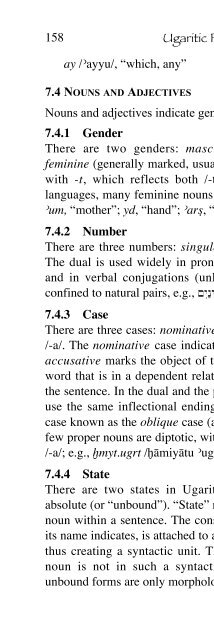A Primer on Ugaritic: Language, Culture, and Literature - enenuru
A Primer on Ugaritic: Language, Culture, and Literature - enenuru
A Primer on Ugaritic: Language, Culture, and Literature - enenuru
Create successful ePaper yourself
Turn your PDF publications into a flip-book with our unique Google optimized e-Paper software.
158<br />
ay /}ayyu/, “which, any”<br />
7.4 NOUNS AND ADJECTIVES<br />
<strong>Ugaritic</strong> <str<strong>on</strong>g>Primer</str<strong>on</strong>g><br />
Nouns <strong>and</strong> adjectives indicate gender, number, case, <strong>and</strong> state.<br />
7.4.1 Gender<br />
There are two genders: masculine (generally unmarked) <strong>and</strong><br />
feminine (generally marked, usually by -t). The feminine is written<br />
with -t, which reflects both /-t-/ <strong>and</strong> /-at-/. As in all Semitic<br />
languages, many feminine nouns are not marked as feminine (e.g.,<br />
}um, “mother”; yd, “h<strong>and</strong>”; }ars, “earth”; npsû, “spirit, throat”).<br />
7.4.2 Number<br />
There are three numbers: singular (unmarked), dual, <strong>and</strong> plural.<br />
The dual is used widely in pr<strong>on</strong>ouns, the nominative declensi<strong>on</strong>,<br />
<strong>and</strong> in verbal c<strong>on</strong>jugati<strong>on</strong>s (unlike Hebrew, where it is mostly<br />
c<strong>on</strong>fined to natural pairs, e.g., MˆyÅnyó, “two eyes”).<br />
7.4.3 Case<br />
There are three cases: nominative /-u/, genitive /-i/, <strong>and</strong> accusative<br />
/-a/. The nominative case indicates the subject of a sentence. The<br />
accusative marks the object of the verb. The genitive indicates a<br />
word that is in a dependent relati<strong>on</strong>ship to some other element in<br />
the sentence. In the dual <strong>and</strong> the plural, the genitive <strong>and</strong> accusative<br />
use the same inflecti<strong>on</strong>al ending /-a/, thereby becoming a single<br />
case known as the oblique case (also referred to as the gen-acc.). A<br />
few proper nouns are diptotic, with both the gen. <strong>and</strong> acc. ending in<br />
/-a/; e.g., h˙myt.ugrt /h˙aœmiyaœtu }ugarˆäta/, “the walls of Ugarit.”<br />
7.4.4 State<br />
There are two states in <strong>Ugaritic</strong>: c<strong>on</strong>struct (or “bound”) <strong>and</strong><br />
absolute (or “unbound”). “State” refers to the syntactic positi<strong>on</strong> of a<br />
noun within a sentence. The c<strong>on</strong>struct/bound form of the noun, as<br />
its name indicates, is attached to a c<strong>on</strong>tiguous word in the sentence,<br />
thus creating a syntactic unit. The absolute/unbound form of the<br />
noun is not in such a syntactic relati<strong>on</strong>ship. The bound <strong>and</strong><br />
unbound forms are <strong>on</strong>ly morphologically distinguishable in the dual


